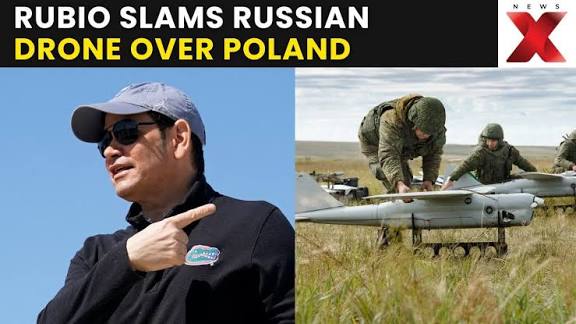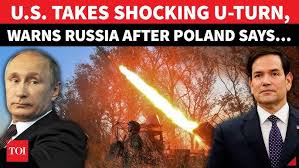Rubio Condemns Russian Drone Over Poland-What Does It Mean for NATO

Marco Rubio condemned Russian drones in Polish airspace as unacceptable. NATO reinforced Eastern rescue. Today we will discuss about Rubio Condemns Russian Drone Over Poland-What Does It Mean for NATO
Rubio Condemns Russian Drone Over Poland-What Does It Mean for NATO
On September 9-10, 2025, an incident occurred that has stirred international concern: a large number of Russian drones entered Polish airspace. The event triggered strong responses from Poland, NATO, and the United States. Among the U.S. reactions, Secretary of State Marco Rubio condemned the drone incursions as “unacceptable, unfortunate, and dangerous development.” His comments, and those of other leaders, carry weight—not just in terms of rhetoric, but in what they reveal about NATO’s posture, alliance cohesion, and the evolving nature of security threats. This article reviews the incident, Rubio’s statement, the legal and strategic implications for NATO, and what might follow.
What Happened: The Drone Incursion
The Basic Facts

On the night of September 9-10, about 19-23 drones entered Polish airspace after being launched from Russia and/or Belarus.
Polish authorities, with NATO support, scrambled jets and used air defenses; up to four drones were shot down.
Airports in the eastern and central parts of Poland (including Warsaw and Lublin among others) closed temporarily while the drones were in Polish airspace. None of the drones were armed with explosives (according to early assessments) though some caused property damage.
Poland’s and NATO’s Response
Poland invoked Article 4 of the NATO treaty, which calls for consultations among allies when a member perceives a threat or breach. This doesn’t automatically trigger military collective defense (which is under Article 5), but it is a serious diplomatic step.
NATO responded by announcing the initiative called Operation Eastern Sentry, aiming to strengthen the alliance’s presence and readiness along its eastern flank.
Rubio’s Statement: Key Points
Marco Rubio, the U.S. Secretary of State, made several important observations when addressing the incident:
Strong condemnation: He called the incursion “unacceptable, unfortunate, and dangerous.”
Uncertainty about intent: Rubio admitted that while it is clear the drones were intentionally launched, it is not yet established whether they were specifically targeted to enter Poland.
Potential escalation: If evidence shows the drones were meant for Poland, Rubio said it would be a “highly escalatory move.”
Call for facts and ally consultation: He emphasized the need to gather full information and work closely with NATO partners before making definitive judgments.
Legal, Strategic, and Political Implications
Rubio’s reaction brings up several deeper issues. Below are a few of the most significant.
1. NATO’s Legal Framework & Obligations
Article 4 vs Article 5: Invoking Article 4 means Poland is asking for alliance consultations. If Poland considered this an attack under Article 5, that would require collective defense measures. Rubio’s careful phrasing—which stops short of calling it an Article 5 situation—reflects both the seriousness of the breach and the cautious approach NATO tends to take in ambiguous cases.
Airspace sovereignty: Under international law, sovereign airspace is protected, and violations are serious. Russia’s claims that the drones were engaged in operations against Ukraine and did not target Poland are part of the legal debate. Intent matters a lot in assessing state responsibility. Rubio’s uncertainty about intent underscores how tough that can be.
2. Deterrence and Alliance Credibility
Demonstrating resolve: By condemning the incursion and supporting Poland’s reaction, the U.S. (through Rubio) sends a message: NATO considers its eastern boundary non-negotiable. Any breach, even if ambiguous, will be met with diplomatic, and potentially military, responses.
Testing thresholds: Russia may be probing NATO’s red lines—how far it can push without triggering collective defense. Whether the drones were meant to test Poland or as spillover from operations in Ukraine, the effect is similar: NATO must decide at what point retaliation or escalation becomes justified. Rubio’s warning that a deliberate targeting of Poland would be “highly escalatory” signals what that threshold might be.
3. The Risk of Escalation
If investigation shows that Russia intentionally targeted Polish territory, this could lead to:
Increased military readiness along NATO’s eastern flank.
Additional deployments or defense assets in Poland and neighboring states.
More aggressive postures from NATO members or allied nations.
Conversely, if it was accidental or unintended—but poorly managed—that still raises risks. Miscalculations could lead to unintended escalation. Rubio’s emphasis on gathering facts first shows awareness of how fragile these dynamics are.
4. Alliance Unity & Internal Politics
Poland has demanded strong solidarity. It has publicly rejected suggestions (including those from U.S. sources) that the incursion might have been a mistake.
Tensions can arise when U.S. statements are more cautious, while frontline states like Poland are more forceful. Over time, repeated incidents can test the coherence of NATO’s response—or reveal divisions. Rubio’s effort to strike a balance between condemnation and caution reflects a diplomatic balancing act: reassure allies, avoid unnecessary escalation, but maintain pressure on Russia.
What This Means for NATO: Strategic Shifts & Possible Futures
Given Rubio’s statement and the broader reaction, here are some of the shifts and strategic possibilities for NATO.
A. Strengthening Eastern Flank Defenses
Operation Eastern Sentry is a concrete step. Deployments of jets, air defense systems, and joint activities will likely increase. This includes sensor networks, anti-drone capabilities, and perhaps an expanded early-warning system.
How useful was this post?
Click on a star to rate it!
Average rating 0 / 5. Vote count: 0
No votes so far! Be the first to rate this post.
About the Author
usa5911.com
Administrator
Hi, I’m Gurdeep Singh, a professional content writer from India with over 3 years of experience in the field. I specialize in covering U.S. politics, delivering timely and engaging content tailored specifically for an American audience. Along with my dedicated team, we track and report on all the latest political trends, news, and in-depth analysis shaping the United States today. Our goal is to provide clear, factual, and compelling content that keeps readers informed and engaged with the ever-changing political landscape.




